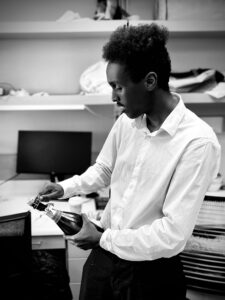By: Sandra Linder
October 14, 2024
Welcome to Soltesz Lab, Tara!
Tara Neddersen (Tahoura Nedaee) is currently pursuing both her B.S. in Biology with a concentration in Neuroscience and her M.S. in biology at Stanford University. In her previous research, she focused on exploring the neural mechanisms behind memory processes. She was named Woman Inventor of the Year in 2019 for her innovative contributions to Neurology. Currently, she is working with Dr. Florian Donneger in the Soltesz Lab, focusing on the role of endocannabinoid signaling in spatial navigation.
September 15, 2024
Ying and Jayashri – Welcome to Soltesz Lab!
Ying and Jayashri are currently rotating in our lab during her studies.
August 29, 2024
Congratulations, Mahad, for passing the Qual exam!
We are excited for you to see you one step closer to your MD/PhD. Cheers!

September 1, 2023
Congratulations Assistant Professor Jordan!
In 2023, Jordan became a faculty member and started his own lab in Neurology at Harvard Medical School and the Rosamund Stone Zander Translational Neuroscience Center and F.M. Kirby Neurobiology Center at Boston Children’s Hospital. His lab aims to understand how basic mechanisms that support healthy brain functions become hijacked in epilepsy to drive pathophysiology. His lab’s most recent focus is unravelling how local circuit and large-scale network mechanisms, which normally control memory processes, become substrates for hypersynchronous, pathological activity in epilepsy. To translate their findings, his group develops non-invasive ultrasound approaches to re-tune neural circuits with high spatial and cell type-specific precision.
March 1, 2023
Florian – Welcome to Soltesz Lab!
Florian completed his PhD in Neuroscience with Dr. Jean Christophe Poncer at Sorbonne University (Paris). During his PhD, he explored the mechanisms regulating the expression and function of the K+/Cl- transporter type 2 (KCC2) in the brain and investigated the therapeutic potential of targeting this transporter in temporal lobe epilepsy (TLE). He is excited going the lab and will focus more specifically on the mechanisms underlying pathological ensemble activities in the epileptic brain.
Ivan Soltesz and his colleagues have found that a marijuana-like chemical in the brain calms epileptic seizures but also increases memory loss. […]
October 15, 2020
Mahad – Welcome to the Soltesz Lab!
Mahad is a medical student at Stanford. He graduated from the University of Washington with a B.S. in Neuroscience. He now plan to work with Dr. Farrell to investigate the role of the medial mamillary body in spatial cognition, as well as in the encoding and retrieval of memory.